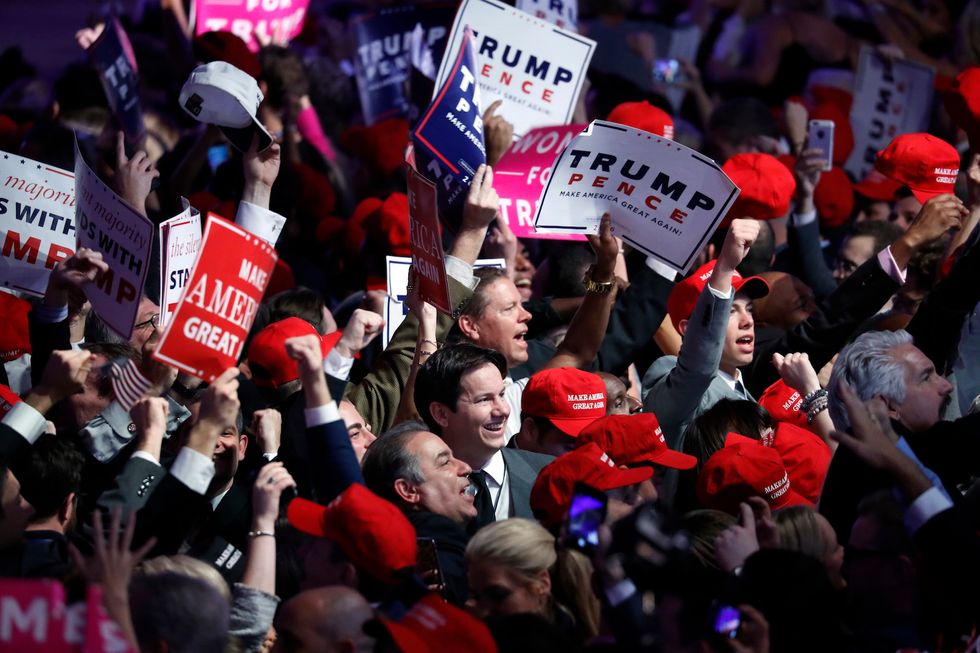
Supporters cheer as they wait for President-elect Donald Trump to give his acceptance speech during his election night rally in New York. (AP Photo/Mary Altaffer)

The rumors of the science of polling’s demise may have been exaggerated.
Conventional wisdom among the talking heads is that the national polling completely missed the Trump victory last night. Numerous political on-air pundits pronounced that polling, as a science, was guilty of a “Brexit-level miscalculation” when it came to the 2016 U.S. presidential race.
Actually, most of the national polling was very accurate — more accurate than it was in 2012, 2014, and the 2016 primaries.
President-elect Donald Trump’s victory was certainly an enormous surprise, which contributes to the perception that the data upon which the vast majority of pundit predictions were based was deeply flawed, but the final result, from a polling standpoint, was remarkably close to what the polls predicted (more on that later).
Some of the state-level polls appear to have narrowly missed the mark in Pennsylvania and Michigan — and drastically missed the mark in Wisconsin. These factors gave the impression of a national race that was actually not as close as the national polls were suggesting. This assumption was an understandable one: In 2012, the state polls suggested a more comfortable national lead than the national polls suggested, and the state polls were more correct about that than the national polls.
Additionally, it has long been conventional wisdom that a smaller, more geographically contained populace (such as a single state, as compared to the entire country) is easier to poll correctly. Long-established political conventional wisdom about how to interpret conflicting polling data suggested that Trump was in fact heading for a popular vote loss of at least four points last night, and quite possibly more. That is the assumption that many pundits made from the polling.
But it is important to note that that is not what the polls actually said. Of the 11 national four-way polls taken most recently before the election, nine of them predicted a Clinton win of between two and four points. One (IBD/TIPP) predicted a Trump win of two points. The LA Times/USC poll two-way poll showed Trump winning by three. Although the LA Times/USC poll is being lauded today for having “accurately” predicted the election, it actually missed the mark worse than the average two-way poll.
It looks likely that Clinton will finish with a lead that is almost one full percentage point in the national popular vote. She currently leads by about one-tenth of a point and an overwhelming portion of the vote that has yet to be counted is on the West Coast, including heavily Democratic population centers in California. Most models show that Clinton is likely to end up winning the national popular vote by just over half a point. A poll that shows Clinton winning by two or three points was much more correct than the LA Times/USC and IBD/TIPP polls showing Trump winning nationally by two or three.
And that is exactly where many of the national polls landed. The RCP average of national polls shows that, on average, the polls predicted a 3.3-point victory for Hillary Clinton, which means that they missed the final result by about 2.5 points. By way of contrast, the RCP national poll average missed the final result in 2012 by 3.2 points.
The data forecasters had to work with this cycle was actually pretty good. It predicted with a fairly high level of confidence that Hillary Clinton would win the popular vote narrowly, and that is exactly what happened. It happens that the lead was slightly narrower than predicted, and the vote distribution freakishly occurred in such a manner as to give Donald Trump the Electoral College victory. It also just so happens that many seasoned political observers drew assumptions from those polls with much more confidence than they perhaps should have, but that isn’t the fault of the polls themselves.